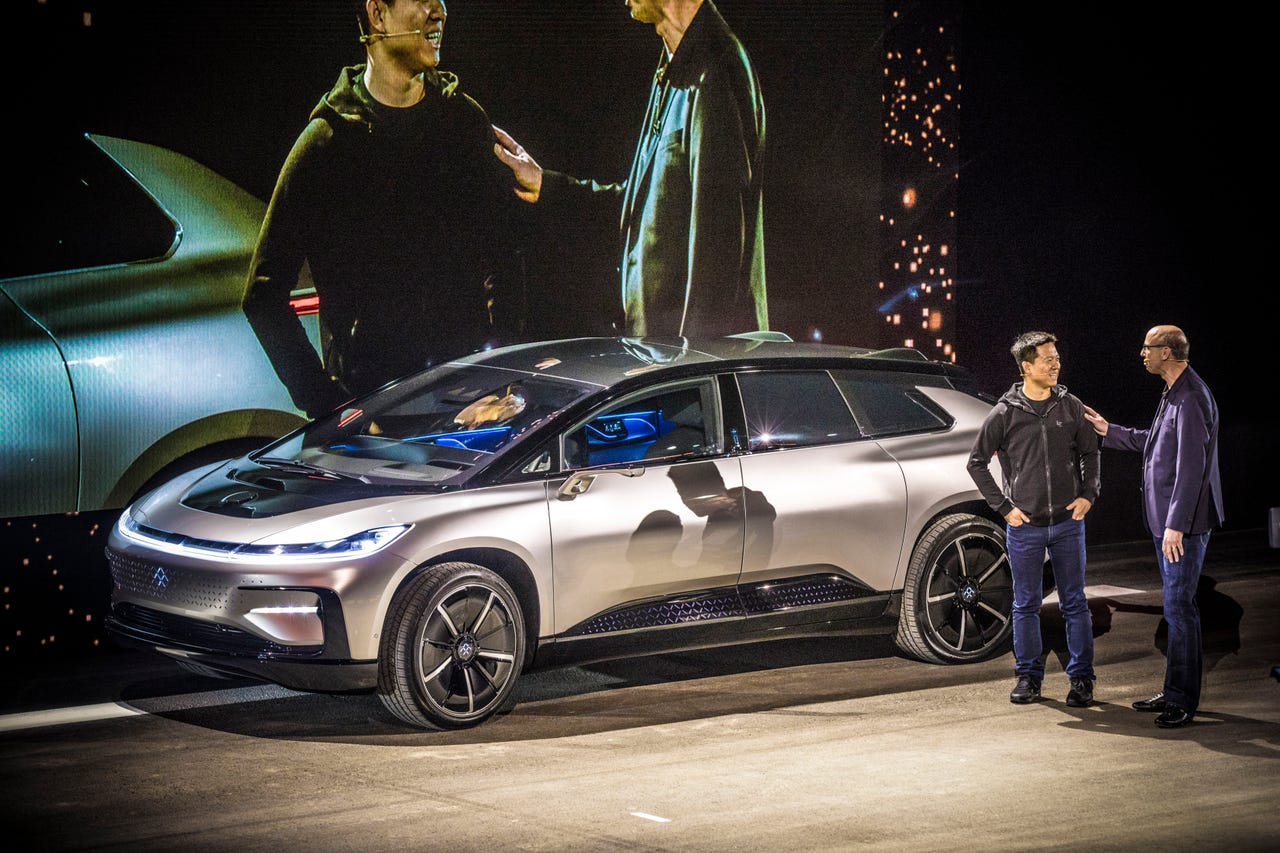Faraday Future's FF 91: Here's the IT stack that's supposed to make the AI, big data magic happen

CES 2017
Faraday Future at CES 2017 launched its FF 91, an electric vehicle that's designed to compete with Tesla, and outlined a mantra to "reformat the future" of the auto industry with artificial intelligence, connectivity and design. The big question is what enabling technologies Faraday Future will use to back up its promise.
Despite reports noting troubles with Faraday ranging from funding questions to the reality that its plant isn't constructed, what the company was pitching was interesting. As CNET Roadshow noted:
Faraday Future has been getting some, ahem, press of late, with reports of senior employees jumping ship, delays of its $1 billion dollar factory in Nevada due to unpaid bills and debts in the hundreds of millions of dollars.
Nevertheless, the company has 1,400 employees, 194 patents and a lot of growth in two and a half years despite not having a product. Faraday's FF 91 is supposed to be a vehicle that would learn you, your passengers and adapt to your preferences to delight you. That mission is going to require enough artificial intelligence knowhow to rival Google, Microsoft and Facebook.
Faraday's launch was glitzy, but left me with a vaporware feeling that requires more investigation. As I was watching the Faraday Future launch of the FF 91, I kept coming back to the same one word question: How?
Turns out there were more questions to ponder.
How is a company that has recently had funding hiccups going to deliver this car? What is the marketing strategy? What's under the hood technology-wise beyond buzzwords? How will Faraday Future integrate technologies in a way that's unique? And how will it markedly disrupt Tesla?
The one thing I do know is that to deliver on anything, Faraday Future will need a technology stack that does something groundbreaking beyond fancy slides during a vehicle launch. By digging around through Faraday Future's career section, I'm able to put a rough guess on what technologies will put meat on the FF 91 promise.
Here's a look at the information technology stack, which looks a bit conventional in many ways for a company built on disrupting the auto industry.
Enterprise back-end: Faraday Future is clearly an SAP shop on the finance side to the data. There are multiple positions available for business analysts as well as data scientists that need to know SAP S4/Hana. For instance, one business analyst post notes that the person hired will be responsible for design and architecture of S4/Hana and reporting. There are also roles for folks with SAP finance knowhow.
While the manufacturing and finance systems appear to be pegged to SAP, Faraday Future appears to be betting on Salesforce for CRM, marketing and sales. The company is looking for developers familiar with Salesforce Apex and Visualforce.
Meanwhile, Faraday is looking for two digital commerce pros to create a sales process. Right now, the FF 91 can only be reserved.
Databases: For a company that's a bit more than two years old, Faraday Future as accumulated a few databases. The company has a database engineer position posted and one of the basic requirements is "strong experience with various relational databases such as MySQL, Microsoft SQL, MongoDB, NoSQL, Big Data, etc. and knowing when to implement what." Overall, the database role revolves around big data. That fact isn't surprising given Faraday Future's promise revolves around machine learning and artificial intelligence.
DevOps: A DevOps engineer at Faraday Future requires knowledge of VMware vSphere or equivalent, OpenGL development on Linux, Python and automation scripting. "You will primarily be working with code for automated driving systems," said Faraday's job posting.
Cloud and data center: The cloud approach for Faraday looks decidedly hybrid with much of the focus revolving around big data. For production IT, there are roles for Cisco engineers as well as security folks with experience in Cisco tools. There was a brief mention of Amazon Web Services familiarity being a plus for one position, but most of the focus is on VMware.
Data: One cloud architect position for big data requires experience with Hadoop 2.0、Cassandra, Spark, Kafka, Storm and distributed systems. That position revolves around telemetry. A business intelligence role requires prototype metrics and scale-out data driven recommendations. R is also required for some areas. Not surprisingly, many technology roles revolve around folks that can build algorithms for everything from computer vision to behavior planning to mapping and managing sensor data.
The data-centric approach will also apply to Faraday's marketing. The company is looking for marketing data scientists and behavioral science experts.
Customer facing applications. If Faraday can't nail the internet of vehicle or infotainment systems, the FF 91 is going to struggle. Judging from the career listings it's obvious that Faraday Future is betting on Android. Android application developers, framework engineers, multimedia pros and operating system experts are all listed positions. Embedded Linux experience is also needed.
In addition, Faraday Future will also implement BlackBerry's QNX to some degree. The company is looking for a senior software engineer focused on QNX.
Bottom line: Faraday Future's career listings also feature too many important roles touching design, manufacturing and user experience to conclude that the FF 91 will be production any time soon.
